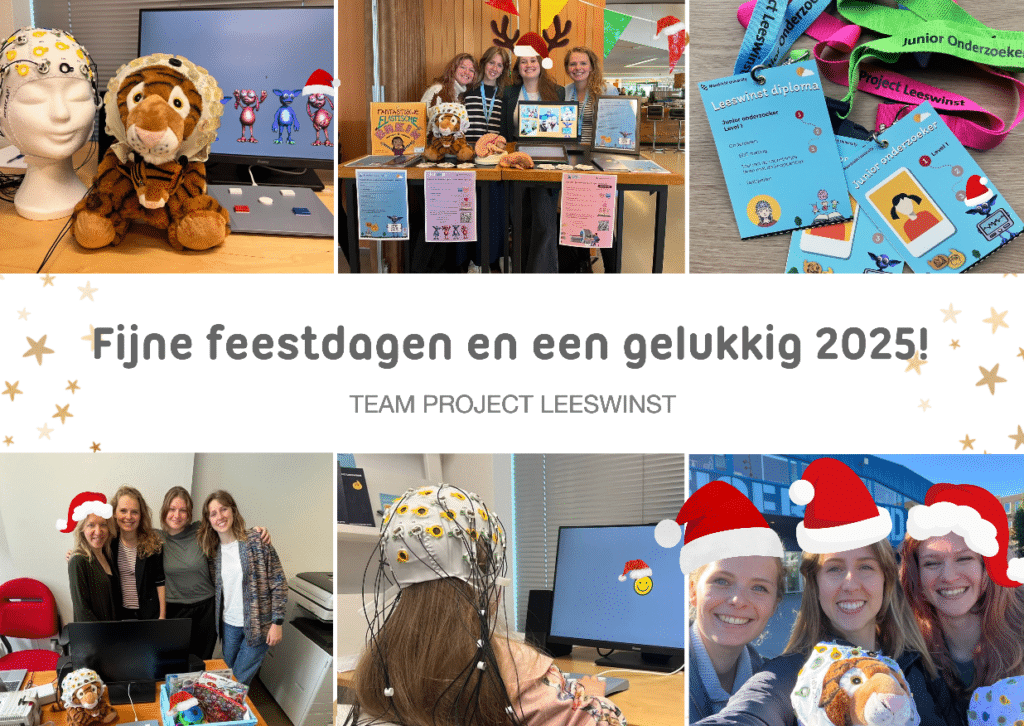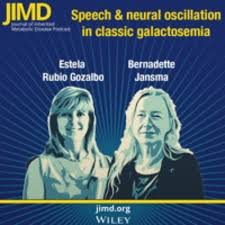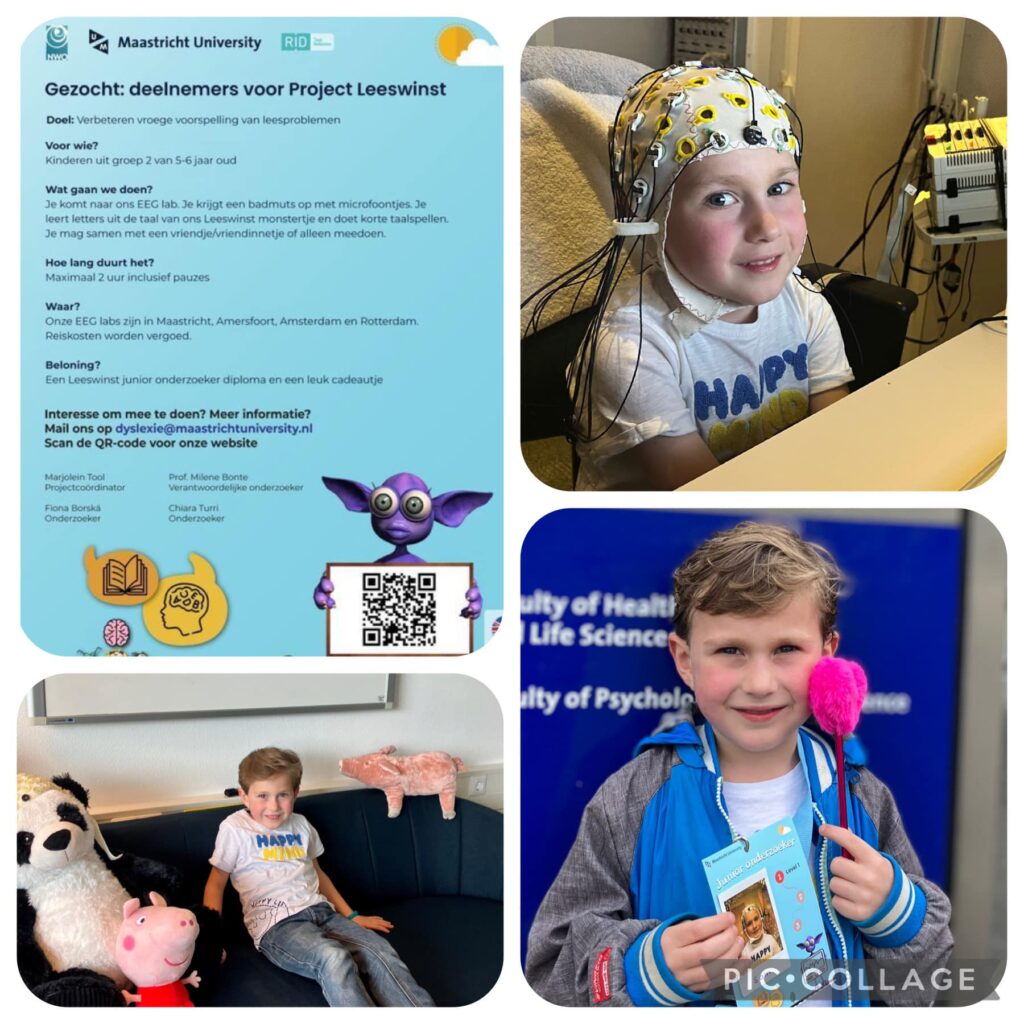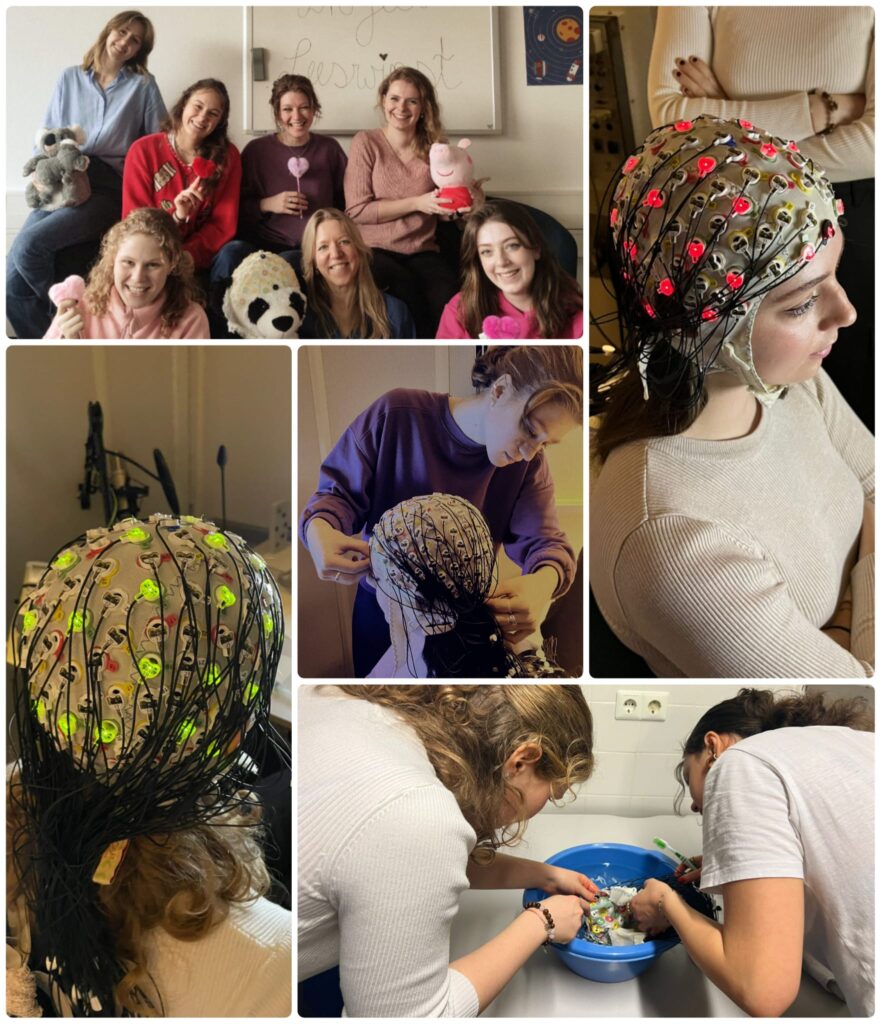Upcoming event! Prof. Milene Bonte will give a talk on “Letter and speech sound learning in typical and dyslexic readers” at the Current Opinion on Audiovisual Integration and Reading (Co-Air) Webinar (11 February 2021), and at the Institute of Research in Psychology (IPSY) at Université catholique de Louvain in Belgium (29 April 2021). See more at https://coairwebinar.wordpress.com/upcoming-events/
Two vacancies in our lab!
Comments Off on Two vacancies in our lab!Postdoc position (3 years) in NWO Vici funded Project Leeswinst
Application deadline March 9 👇
Assistant professor in Developmental Cognitive Neuroscience of Language
Application deadline March 24 👇
Happy holidays and the best wishes for 2025!
Comments Off on Happy holidays and the best wishes for 2025!
Do you also want to participate? (video)
Comments Off on Do you also want to participate? (video)We are super happy with all children that have participated in our research project: Leeswinst! The video below gives you an impression of the EEG sessions. Does your child also want to participate in our study? Please contact us through dyslexie@maastrichtuniversity.nl or our “Get involved” page!
Bernadette Jansma appointed as new Chair of the Supervisory Board Donders Institute
Comments Off on Bernadette Jansma appointed as new Chair of the Supervisory Board Donders InstituteIn september 2024, Bernadette Jasma has been appointed as the new Chair of Donders Institute’s Supervisory Board. he Donders Institute explores the human brain, cognition, and behaviour across various disciplines, including medicine, physics, biology, psychology, AI, and language studies. Read more about the Donders Institute and the appointment of Bernadette here.
We are looking for children in groep 3 for ‘Project Leeswinst’!
Comments Off on We are looking for children in groep 3 for ‘Project Leeswinst’!The new school year has begun! Until now, a lot of children from eind groep 2 have participated in our study. This school year we are looking for children in groep 3 (5-7 year old children). Do you want to contribute to the early prediction of reading problems? Please participate in our research project!
![]() What are we going to do?
What are we going to do?
- You visit our EEG lab. Your child will wear a swimming cap with microphones.
- Your child will learn letters from our Leeswinst monster’ language and play short language games.
- Your child can participate together with a friend or alone.
- It will take about 2 hours including breaks.
- We will make it a fun trip! See our Facebook and Instagram pages for an impression.
![]() What is the reward?
What is the reward?
- Leeswinst junior researcher diploma
- A nice gift
- Travel expenses wil be reimbursed
- In 2025-2026, we will organise a child symposium in which we share the results of our study with parents and children.
![]() Where are our EEG labs?
Where are our EEG labs?
In Maastricht, Amersfoort en Amsterdam
![]() How can I participate?
How can I participate?
Send an e-mail to dyslexie@maastrichtuniversity.nl of fill in the form on https://mbic-languagelab.nl/onderzoek/
PAS festival 7 september
Comments Off on PAS festival 7 septemberDo you want to know more about early prediction of reading problems? On september 7th, Milene Bonte gives a lecture at the PAS festival in Maastricht!
19:30 – 20:00 – Nederlandse lezing
21:00 – 21:30 – English lecture
Children’s reading skills vary widely and reading problems (dyslexia) are only diagnosed after they have developed. Can we improve early prediction of reading problems? What can we learn from brain research? And why is it important to understand individual differences in learning potential, rather than simply relying on static snapshots of knowledge?
For more info about the lecture and the full PAS program (6-7 Sept), see https://english.pasmaastricht.nl/
Project Leeswinst ![]()
![]()
Do you want to contribute to our research? We are looking for children from ‘groep 3’. You can apply on our website https://mbic-languagelab.nl/deelnemen or by mailing to dyslexie@maastrichtuniversity.nl
![]() Maastricht, Amsterdam, Amersfoort.
Maastricht, Amsterdam, Amersfoort.
Podcast about speech and neural oscillation in classic galactosemia
Comments Off on Podcast about speech and neural oscillation in classic galactosemiaEstela Rubio and Bernadette Jansma explain in an interview (JIMD Podcasts) how they applied transcranial alternating current stimulation in Galactosemia patients with language production deficits. The stimulation reduced naming errors. We hope to investigate this now in a larger cohort, and for other cognitive domains in this patient group.
You can find the postcast here.

NRO grant for Project “LeesKans”
Comments Off on NRO grant for Project “LeesKans”Thrilled to receive funding for our NRO project LeesKans: towards optimal interactive development of
early literacy and motivation! 📚
We will be developing and implementing a new ‘dynamic assessment’ tool to differentiate early reading
problems in a new way; based on learning potential rather than snapshots of already available knowledge. This will lead to fairer (reading) opportunities!
Project LeesKans is a collaborative project with consortium partners at UM (Milene Bonte), VU Amsterdam (Nienke van Atteveldt), RID dyslexie (Jurgen Tijms), UvA (Eddie Brummelman), IPABO (Inouk Boerma), Erasmus MC (Hanneke Scholten) en game design studio Game Tailors.
Start Project Leeswinst
Comments Off on Start Project LeeswinstIn April, we started the first measurements in Amersfoort and Maastricht. We are super happy with our first ‘junior researchers’! One of the participating parents shared a great impression on LinkedIn and Facebook.
Do you have a child in groep 2? Then sign up for Project Leeswinst via dyslexie@maastrichtuniversity.nl or via the ‘Get Involved’ button on the website!

Team training Project Leeswinst
Comments Off on Team training Project LeeswinstIn February, the research team of Project Leeswinst came together for a training day! Our team of students, PhD candidates, and coordinators went through all procedures together and practiced on each other. We were trained for EEG data collection and administering neuropsychological tests on children. We specifically focused on ways to make the research as enjoyable and comfortable as possible for young children. For instance, with children, we use a smaller EEG cap with fewer electrodes and demonstrate the cap application first on a stuffed toy.
Due to the diverse backgrounds of our team members, everyone was able to contribute in their own way to the training. It was an informative day, and we are looking forward to kicking off with our enthusiastic team!

Wanted: participants for ‘Project Leeswinst’!
Leave a CommentWould you like to contribute to the early prediction of reading problems? We are looking for 5, 6 and 7 year olds (groep 2 and groep 3) to participate in our study!
![]() What does it involve?
What does it involve?
- You are invited to visit one of our EEG labs.
- Your child can participate together with a friend or alone.
- Your child learns letters from our Leeswinst monster’s language and plays language games.
- Together, we will make this a fun experience!
![]() What’s in it for you?
What’s in it for you?
- Our Leeswinst junior researcher diploma
- A nice gift
- Travel expenses will be reimbursed
![]() Where are our EEG labs?
Where are our EEG labs?
In Maastricht, Amersfoort, Amsterdam en Rotterdam
![]() How can we participate?
How can we participate?
Send an e-mail to dyslexie@maastrichtuniversity.nl of fill in the form at https://mbic-languagelab.nl/onderzoek/
Predicting reading problems at preschool age?
Leave a CommentWe currently cannot accurately predict which children will develop problems in learning to read. There simply isn’t a clear measure for it. If it’s up to Professor Milene Bonte, that will change in a few years. Thanks to the Vici grant she secured, her lab can develop a digital task for preschoolers with fictional symbols and sounds. This learning task should provide a reliable indication of the child’s learning potential. Based on this, the teacher can determine if the child needs additional support. Milene Bonte and Hansje Planjer, Manager of Care and Education at IJsselgroep and a member of the Policy Advisory Committee of the NKD, will discuss this further.
Read the conversation between Milene Bonte and Hansje Planjer at the NKD website!
Predicting reading problems before children can even read
Comments Off on Predicting reading problems before children can even readMore and more children in the Netherlands have a problem with reading. How can this be detected as early as possible? That is what Maastricht neuroscientist Milene Bonte is trying to find out. Recently, she was the only UM researcher who managed to obtain a Vici grant, worth one and a half million euro.
Two PhD vacancies in our lab!
Comments Off on Two PhD vacancies in our lab!
Two PhD vacancies! Join our team on an exciting project bridging science and practice! Learn how to perform developmental brain research in children and design new measures for the early prediction of dyslexia.
Application deadline May 15 👇
Milene Bonte received NWO Vici grant
Comments Off on Milene Bonte received NWO Vici grant
Milene Bonte received a Vici grant of 1.5 million euros from the Netherlands Organisation for Scientific Research (NWO). With the grant she will set-up a 5-year research project to develop novel measures for improved early screening and prevention of reading difficulties. The novel screening measures will be investigated in children with and without family members with dyslexia.
We extend our congratulations to Milene Bonte and look forward to seeing the valuable contributions that the research will make to understanding individual differences in reading development and prevention of dyslexia!
A BOLD scientist under the shower
Comments Off on A BOLD scientist under the showerA BOLD scientist under the shower
Spotify: A Bold Scientist under the shower? | Podcast on Spotify
Facebook: https://www.facebook.com/sciencemusicradioshowaboldscientistundertheshower
Salto: Onda Italiana – SALTO
Language group
What is dyslexia and why the treatment is important
Comments Off on What is dyslexia and why the treatment is importantOn Saturday 21 January, Milene Bonte was interviewed by the BNNVARA tv programme ‘Kassa’.
The interview is about what is dyslexia and why the treatment is so important.
Please see the article and video in this link:
Manli Zhang defence, Tuesday, October 4th at 10:00
Comments Off on Manli Zhang defence, Tuesday, October 4th at 10:00On Tuesday, October 4th, Manli Zhang had her Ph.D. dissertation defence entitled “Cortical tracking of spoken and written language structures in (days)fluent readers”.
Please see the defence record here: https://www.youtube.com/watch?v=P1TnFj3pCLM
Congratulations, Dr. Zhang!
How does dyslexia develop?
Comments Off on How does dyslexia develop?Learning to read and write fluently seems self-evident to most. But actually it isn’t, especially not for people with dyslexia.
In this Dutch lecture How does dyslexia develop? Milene Bonte explains why.
Giada Guerra defence, Tuesday, March 22 at 13 hrs
Comments Off on Giada Guerra defence, Tuesday, March 22 at 13 hrsOn Tuesday, March 22 at 13 hrs, Giada Guerra will defend her dissertation entitled “The contribution of auditory attention to reading processes of school-age children with and without dyslexia”.
The defence will take place onsite in the Aula at Minderbroedersberg 4-6. You can also view the defence online here.
A copy of the thesis can be downloaded via this link.
Good luck, Giada!
Alex Emmendorfer defense, Tuesday, February 22 at 13 hrs
Comments Off on Alex Emmendorfer defense, Tuesday, February 22 at 13 hrsOn Tuesday, February 22 at 13 hrs, Alex Emmendorfer will defend her dissertation entitled “Electrophysiological correlates of phonological and temporal regularities in speech processing”.
The defense will take place onsite in the Aula at Minderbroedersberg 4-6. You can also view the defense online here.
A copy of the thesis can be downloaded via this link.
Good luck, Alex!
Co-Air webinar & IPSY seminar
Comments Off on Co-Air webinar & IPSY seminarResults Project Leeswinst: the first behavioural and (f)MRI findings
Comments Off on Results Project Leeswinst: the first behavioural and (f)MRI findingsWhen a child learns to read he/she needs to learn to correctly combine text and corresponding speech sounds (e.g. the letter ‘a’ and the speech sound /a/). Scientific studies have shown that it may exactly be this combination of text and sound that is difficult for children with dyslexia and leads to their reading problems. In project Leeswinst we want to understand why this is the case and how brain responses to letters and speech sounds change when children with and without dyslexia improve their reading skills over time. A group of seventy 8-10 year old children visited our MBIC lab to perform an ‘aba’ ‘ada’ task on the computer and in the MRI scanner. In the ‘aba’ ‘ada’ task, the children hear an ambiguous speech sound that is sometimes perceived as /aba/ and sometimes as /ada/. Together with this speech sound they see ‘aba’ or ‘ada’ text on a computer screen. Children’s task performance and brain activity tells us how they combine letters and speech sounds.
The first results of our project surprisingly show a similar performance in children with and without dyslexia, apparently indicating a similar coupling of the ambiguous sound and ‘aba’ or ‘ada’ text. However, children’s brain activity as measured in the MRI scanner reveals some interesting differences. Children with dyslexia show significantly less activation in a visual brain area specialized for text (brain area in pink in the picture below) compared to typically reading children. Moreover, regardless of dyslexia diagnosis, this area was less active in children with worse reading skills and worse performance on a task with speech sounds. We also observed that children who are slower in combining letters and speech sounds, have less activation in auditory brain areas that are important for creating letter speech sound combinations (brain area in blue in the picture below). Together these results show that individual differences in children’s reading skills relate to the way in which auditory and visual brain areas process speech sounds and letters. The next important question is now whether and how these brain areas changed when the same children came back to our MRI lab one year later and again performed the same ‘aba’ ‘ada’ task. We are looking forward to presenting these follow-up results in the coming months.

Dyxlexia conference Bussum
Comments Off on Dyxlexia conference BussumOn December 17th 2019 Prof. Dr. Milene Bonte gave a lecture about reading in the brain titled “Wat zegt het ‘lezend’ brein over dyslexie?” during a Dutch dyslexia conference in Bussum.
More information can be found on the website https://www.dyslexiecongres.nl/programma.
Project Leeswinst poster presentation in Helsinki
Comments Off on Project Leeswinst poster presentation in HelsinkiWe were happy to present the findings of our research project at the Eleventh Annual Meeting of the Society for the Neurobiology of Language which took place August 20-22 in Helsinki, Finland.
We got inspired from fellow researchers investigating language and reading processes and received compliments as well as insightful comments and suggestions for our project.
You may find a digital copy of the poster here:
Conference location – Finlandia Hall

On plastic brains and the sound of letters
Comments Off on On plastic brains and the sound of letters
Milene Bonte’s oratie “On plastic brains and the sound of letters” vond plaats op vrijdag 5 Juli. Voor een video link naar de lezing zie: https://mediasite.maastrichtuniversity.nl/Mediasite/Play/4108283d1b734890a66b7a0bac3b7f151d
Kindercongres Leeswinst a success
Comments Off on Kindercongres Leeswinst a success
Project Leeswinst poster presentations
Comments Off on Project Leeswinst poster presentationsWe have recently presented the findings of project Leeswinst in the SIG22 Neuroscience and Education conference in London in June and Flux: The Society for Developmental Cognitive Neuroscience meeting in Berlin in September. Our preliminary findings show that parts of the brain that we use for speech perception were less active in dyslexic children, while brain regions typically associated with more effortful, letter-by-letter reading were more active compared to typically reading children. The findings were well received and gave us new ideas on how to further analyse and present our fascinating data.
You may find the posters here:
DOI: 10.13140/RG.2.2.35658.21448
DOI: 10.13140/RG.2.2.11331.25127

Talk on neural correlates of reading in dyslexic and typically reading children
Comments Off on Talk on neural correlates of reading in dyslexic and typically reading childrenPost-doctoral researcher Gojko Žarić will give a talk titled “Neural correlates of (dys)fluent reading acquisition in typically reading and dyslexic children” at the Basque center on cognition, brain and language on October 30th. In this talk Dr. Žarić will discuss the findings of his PhD and Post-doctoral research conducted at Maastricht University.
For more details see: http://www.bcbl.eu/activities-and-seminars/gojko-zaric-phd-neural-correlates-of-dysfluent-reading-acquisition-in-typically-reading-and-dyslexic-children/
Interview on dyslexia myths
Comments Off on Interview on dyslexia mythsThe most recent issue of Maastricht University’s newspaper “Observant” features an interview with the Language group’s Principal Investigator Milene Bonte. This interview is part of the “Myth Busters” series, in which researchers address common myths in their research. Read the full article here: